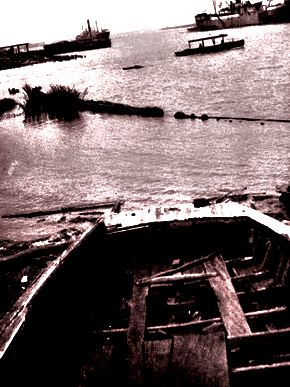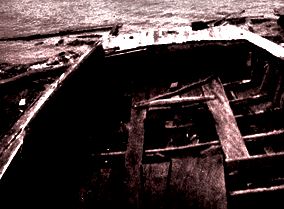In a three-part series, Gary Wright tells the story of “Clotilda”—the last slaving ship
On a Distant Shore
by Gary Wright
“You cannot play God without becoming acquainted with the Devil.”
—Jonathan Nolan, ‘Westworld, the Series’

(Remnants of the Clotilda)
Our story begins in 1808 when the American Congress, following the rest of the civilized world, abolished the importation of slaves into the U.S. It did not make slavery in America illegal, only the importation of new slaves into America. The blight of slavery would continue on the conscience of all good Americans for nearly sixty more years until the blood of many cleansed our land of that evil. Slavery was never widespread in the north, and between 1774 and 1804, all of the northern states abolished it, one by one.
In a peculiarly perverted irony, many of the north’s businessmen, while soundly opposing it, grew rich on the slave trade and investments in southern plantations where slavery remained vital to the South’s unique economy. After 1808, the domestic trade flourished, and the slave population in the U.S. nearly tripled over the next 50 years. By 1860 nearly four million Negroes were enslaved in America, with over half living in the cotton-producing states of the South. Wealthy Americans, just like all property owners worldwide throughout history, saw slavery as an indecent institution but preferred to kick the can down the road and abolish it one step at a time. In 1820 the introduction of Africans was declared an act of piracy punishable by death.
Chapter two of our story occurred in the summer of 1858 when John Dabey of Mobile, Alabama and some other slave owners met with slave owners and shipbuilders, Timothy and his brother Byrnes Meaher. The meeting took place aboard the Roger B. Taney, a steamboat owned by Timothy Meaher as it cruised the Alabama River en route from Montgomery to Mobile. Roger B. Taney was the U.S. Supreme Court Justice who delivered the tie-breaking decision in the Dred Scott case which required all states, including northern states, to return escaped slaves whenever and wherever found. Various Yankee mercantile buyers were in town to look at the local cotton crop for possible use in their New England mills and were being wooed by Meaher for business purposes.
After several flagons and shots of the best brew that southern Alabama had to offer, talk shifted to what they thought was a growing problem: the lack of good slaves hereabouts to tend and harvest the burgeoning cotton crops. The Yankee mill owner remarked, “I could buy twice the amount of cotton presently available.”
Tim Meaher replied, “Aye, if only we had the black folks to plant and harvest it.”
“Has it nothing to do with the manner you’d be using in the growing of the white gold?” asked another inebriated Yankee as he ordered another flagon.
“Nay,” said John Meaher, “we’re harvesting a half bale to the acre on good bottom land.”
Talk of this type by men of money and power where the alcohol flows too freely, always leads to no good. That night was no exception and, before the night was concluded, the Meaher Brothers placed a $100,000 wager with the Yankee industrialists that they could outfit one last slave ship and bring in a load of black slaves from Africa, right under the nose of federal officials. A perverted sense of Southern honor was on the line, and the Yankees took the wager. As secessionist fever was spreading throughout the entire south in the 1850s, there was much talk of reopening the African slave trade, which had been outlawed since 1808. It was in this time of intrigue and saber rattling that this evil scheme was devised in the minds of such dubious and devious human beings.
The Meaher Brothers hired William “Bill” Foster to outfit their ship, the Clotilda and to serve as her captain. The Clotilda was named after Queen Clotilda, wife of King Clovis of the Franks. She was instrumental in converting Clovis to Christianity and, ultimately, the entire French nation. Ironically, Queen Clotilda is remembered for her works of mercy. Ships from Mobile plied the seven seas in those days and Foster was able to learn from other captains that that West African tribes were always fighting. He also learned that the King of Dahomey had a going price of $60 apiece for Africans captives from the Kingdom of Whydah (modern day Benin,) on the West African so-called Slave Coast.
The outline of the African ‘Slave Coast’ came slowly into view as the ship’s First Mate approached Captain Foster on the main deck. “Cap’n, me and the crew’s been talking.” Foster busied himself looking over his sea chart.
“Zat so?” replied the Captain.
“We heard talk before we left port and we been talkin’ mongst ourselves.”
“Yeah! ‘Bout what?”
“We know she’s a slaver. The Clotilda, I mean.”
“Slaving’s illegal.” the Captain answered, “Been illegal going on sixty years, now.”
Under the terms of The Slave Trade Act of 1807, importation of new slaves to the States and a violation of this law could result in the death penalty to the perpetrators. Any military naval vessel bearing any country’s flag could board and arrest any crew engaging in the transportation of slaves. Further, any merchant vessel Captain who was brave or foolhardy enough could forcibly seize a slaving vessel and claim her as a prize. Captain Foster and his crew knew what they were up against.
“Seems to me,” said the First Mate nervously, “that me and the rest of the men oughta be gettin’ more’n jist normal seaman’s wages for this trip.”
“Well, you ain’t.”
“If’n you don’t make some sorta accommodation for a slaver’s crew, there might be more danger for the Cap’n . . . .” He trailed off, stopping short of making a threat but enough so that the meaning was conveyed.
“Whoa!” said the Captain, “you better watch yourself, Matey. Mutiny is illegal.”
“So’s captaining a slaver. I don’t reckon the law would do much to a crew that mutinied on a slavin’ ship.” The First Mate spit on the deck to accentuate his point.
The Captain stood up straight and stopped his act of trying to look at the charts. He looked dead on into the steely eyes of his First Mate, who did not flinch. The Captain started to say something, but instead, looked over the First Mate’s shoulder and saw the rest of the crew and he knew that they had voted on the issue at hand. He knew it was one against all of the crew.
“I think we can reach some sort of . . . what did you call it? An accommodation.”
“Yeah, an accommodation.”
“Okay, Mate, consider you and all the crew to have doubled your wages for this trip.”
“Mighty nice, Cap’n. Consider us an, er, accommodated crew.”
Captain Foster knew only too well that an illegal mutiny aboard an illegal slaver would not be prosecuted. Any ship outfitted as a slaving ship was considered a pirate ship and could be boarded, fired on or otherwise treated as a treasonous act. Captain Foster knew that his life was in the balance from an unruly crew, his slave captives, or a navy ship from any civilized nation.
(Part two to follow)



